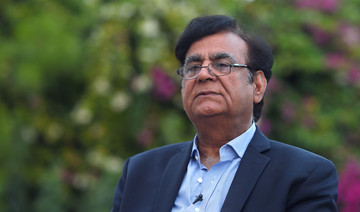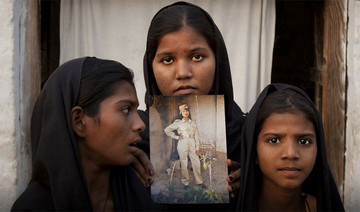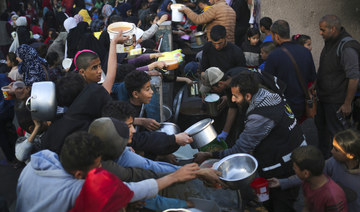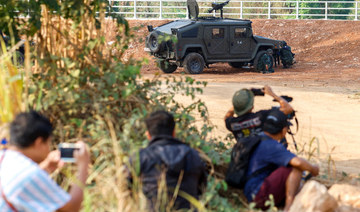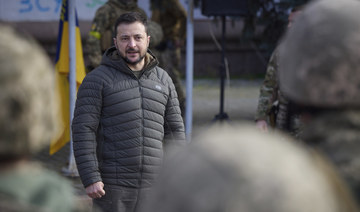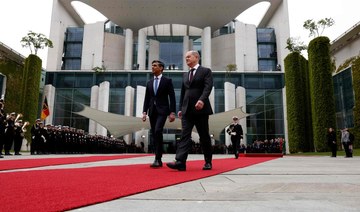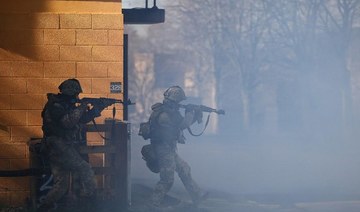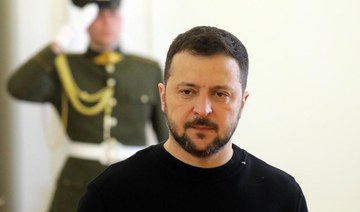MULTAN, Pakistan: Police in Pakistan say over 150 people have been arrested on charges of arson, vandalism and violence during the protests that erupted after a Christian woman was acquitted of blasphemy charges that carried the death penalty.
Senior police officer Nayab Haider said Sunday that police were using video clips to identify others involved in assaults, torching property and vehicles, and blocking highways.
Pakistan’s top court acquitted Asia Bibi on Wednesday in a move that infuriated hard-line Islamists, who held three days of nationwide protests demanding her execution. The Islamists ended the protests after the government agreed to impose a travel ban on Bibi and to allow her case to be reviewed.
Insulting Islam is punishable by death in Pakistan, and the mere rumor of doing so can incite lynchings.
Pakistan arrests 150 over violence at blasphemy protests
Pakistan arrests 150 over violence at blasphemy protests
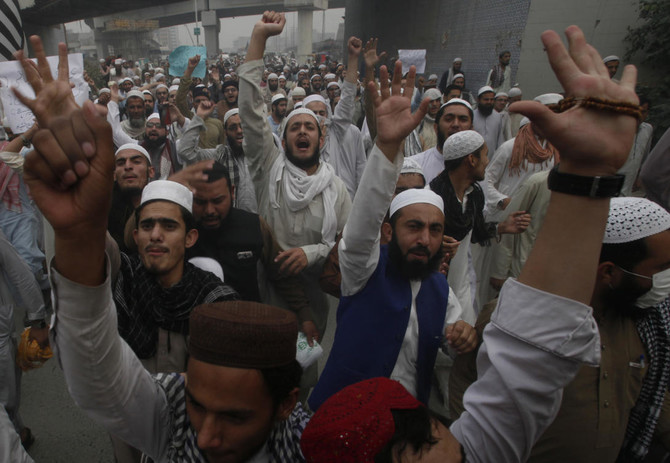
- Pakistan’s top court acquitted Asia Bibi on Wednesday in a move that infuriated hard-line Islamists
- Protests died down after the government agreed to impose a travel ban on Bibi
Paradigm shift needed to meet massive needs of people in Gaza, UN Security Council hears
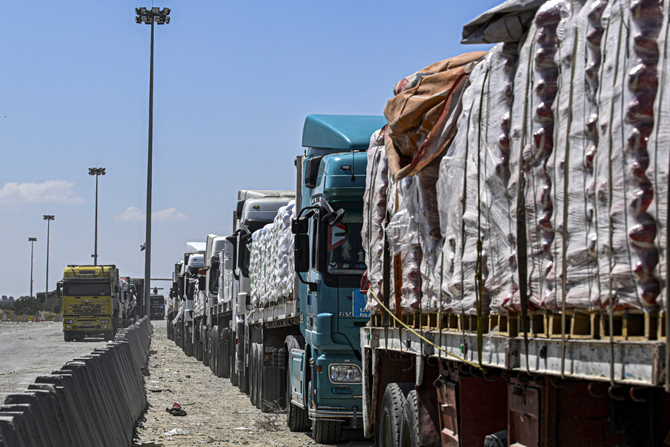
- It requires scaling up of volumes of aid, ensuring safety of humanitarian workers, and making preparations now for the reconstruction and recovery process
- Sigrid Kaag warns disease threatens to sweep through the territory and children are deprived of nutrition, protection and education, their futures hanging in the balance
NEW YORK CITY: The UN said on Wednesday that if it is to avert the threat of famine and meet the massive humanitarian needs of the civilian population in Gaza in a safe and secure manner, a paradigm shift is needed.
This will require scaling up of volumes and distribution of aid, ensuring safety of workers delivering assistance inside the territory, and making a start now on preparations for the reconstruction and recovery process.
Underscoring the fact that there is no substitute for the political will to sustain such work, Sigrid Kaag, the senior humanitarian and reconstruction coordinator for Gaza, echoed repeated calls by UN Secretary-General Antonio Guterres for a ceasefire, the immediate and unconditional release of all hostages held by Hamas, and the unrestricted flow of humanitarian aid to the population of the ravaged enclave.
She also expressed grave concern about a threatened Israeli incursion into the city of Rafah in southern Gaza, which has become the last refuge for more than 1.5 million Palestinians, most of them displaced by fighting in other parts of the territory.
A ground attack “would compound an ongoing humanitarian catastrophe, with consequences for people already displaced and enduring severe hardships and suffering,” she said.
Kaag was appointed by Guterres following the adoption of Security Council Resolution 2720 in December last year, which called on him to task a senior official with “facilitating, coordinating, monitoring and verifying” in Gaza, as appropriate, the humanitarian nature of all humanitarian relief consignments provided through states that are not parties to the conflict.
As she shared her assessments with members of the Security Council on Wednesday, Kaag said Israel continues to reel under the “deep trauma” of the Oct. 7 attacks by Hamas and the uncertainty about the fate of the remaining hostages. Meanwhile more than 34,000 people have been killed in Gaza, tens of thousands injured or maimed, and livelihoods, homes, schools and hospitals have been destroyed, she added.
“The health infrastructure in Gaza has been decimated” and the few hospitals left standing are operating amid severe shortages of supplies and frequent power outages, Kaag said.
“As summer draws near and temperatures rise, communicable diseases threaten to sweep through Gaza. Children, who in every crisis suffer the worst and the most, are deprived of nutrition,
protection and education, their futures hanging in the balance.
“The scarcity of food and other essential goods has also led to a breakdown in civil order and the gradual unraveling of the social fabric in Gaza.”
Effective humanitarian operations cannot be reduced “to counting trucks,” Kaag said as she emphasized the important need for humanitarian agencies to be able to transport consignments of food, medicine and other supplies safely using all possible routes and crossings. In this context, she said, the work of the UN Relief and Works Agency for Palestine Refugees is “pivotal.”
She added: “UNRWA is irreplaceable and indispensable as a humanitarian lifeline and must be allowed to deliver on its mandate.”
The agency has been facing a severe crisis since Israeli authorities alleged in January that a dozen of its workers participated in the Oct. 7 attacks. A report published this week following an independent review of UNRWA revealed that Israel has yet to provide any proof in support of the allegations, and noted that for the past 13 years, authorities in Tel Aviv failed to raise any concerns about individuals named on staffing lists the agency shared with them.
This month, in response to international pressure, Israel made several commitments intended to improve the delivery of humanitarian supplies to Gaza, including scaling up of volumes of aid, the opening of additional border-crossing points and for longer hours, repairs to a damaged water pipeline, and permission for bakeries in northern and central Gaza to resume making bread.
However, given the scope of the destruction and the extent of the human suffering in the territory, Kaag said “further definitive and urgent steps are needed.” These include repairs to roads, timely provision of authorization for aid convoys, arrangements for evacuations of hospital patients and casualties, and more-effective mechanisms for protecting humanitarian workers on the ground.
She also spoke of efforts to streamline the delivery of aid shipments to Gaza from Jordan, Egypt and Cyprus, with the UN proposing an inspection, monitoring and verification unit be established on the Palestinian side of border with Egypt at Rafah.
However, she said that although work to build a floating port and pier on the Gaza shore continues to advance, a maritime corridor from Cyprus “can never be a substitute for delivery by land. Land routes are the only way to bring in the bulk of supplies needed.”
The extent of the destruction and the devastating effects of the war on the entire population call for an ambitious, comprehensive plan of support, with the level of investments this requires, Kaag said. The scale of the investment required is clearly revealed by the need to “rebuild and repair more than 84 percent of destroyed health facilities” and for “the return of an entire student population to school while educational facilities have been destroyed.”
She added: “The Palestinian Authority has a critical role to play in Gaza. The international community must work toward enabling its return, strengthen its governance capacity, and prepare it to reassume its responsibilities in Gaza.
“All efforts toward early recovery and reconstruction also need the participation of Palestinian civil society. Fostering a conducive environment to reestablish the commercial sector in Gaza and the engagement of the Palestinian business community and its investors are equally important.”
State Department official reaffirms US commitment to humanitarian aid for Gazans
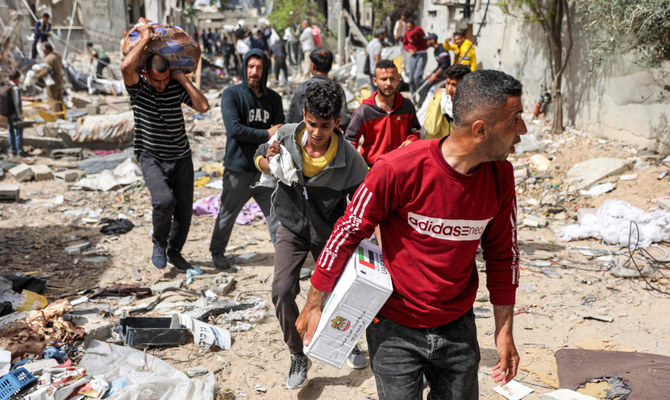
- Efforts also continue in Washington to prevent regional expansion of conflict by Iran and its proxies, says Assistant Secretary for Near East Affairs Barbara A. Leaf
- The Biden administration is also looking into the circumstances surrounding the discovery this week of mass graves in Gaza, she adds
CHICAGO: The US is working to speed up the delivery of humanitarian aid to the people of Gaza, all of whom are at risk of malnutrition or famine, a leading official from State Department said on Wednesday.
Assistant Secretary for Near East Affairs Barbara A. Leaf also said that efforts continue in Washington to deter Iran and its proxies from attempting to provoke any regional expansion of the conflict, amid concerns about escalations in violence in Iraq, Lebanon, Europe and Yemen.
President Joe Biden and Secretary of State Antony Blinken remain committed to securing peace between Israel and the Palestinians through direct negotiations, Leaf said, and to using all available means to provide the population of Gaza with aid, including the UN Relief and Works Agency for Palestine Refugees.
The Biden administration is also examining the circumstances surrounding the discovery this week of mass graves in Gaza, she added. Officials are “making inquiries and trying to learn, ourselves” but she had no additional information to share at this time.
Regarding the humanitarian crisis in the Gaza Strip, Leaf said: “One hundred percent of the population in Gaza is at risk of famine and malnutrition. Deconfliction (a military term for efforts to reduce the risk of friendly fire or the targeting of noncombatants) coordination remains a major issue for humanitarian workers and exports.
“We are pushing to accelerate the delivery of assistance on all fronts by air, land and sea. We urge Israel, and continue to urge Israel, to improve deconfliction and take tangible steps to allow the entry of more aid, and distribution of that aid, throughout Gaza. We also believe the UN, including UNRWA, is indispensable for that effort.
“We are committed to advancing enduring peace and security for Israelis and Palestinians alike, including through practical time-bound and irreversible steps to work toward establishing a Palestinian state existing side-by-side with Israel.”
Leaf declined to comment on how funding would be directed to help address the “extreme” humanitarian needs in Gaza but acknowledged that the US Congress and several other major donor countries had suspended funding for UNRWA following allegations in January by the Israeli government that 12 of the agency’s workers participated in the Oct. 7 attacks by Hamas on Israel.
A report published this week following an independent inquiry into UNRWA’s mechanisms for ensuring the neutrality of its workers stated that Israeli authorities have not provided any evidence to back up their claims. Some countries have resumed their funding of the agency but the US has not.
“The Congress has ruled out the US providing assistance directly to UNRWA,” said Leaf. “There are many other avenues, channels and organizations by which we can assist the Palestinian people.
“We do recognize that the functions that UNRWA carries out are indispensable and that there is no ready replacement for UNRWA in carrying out those responsibilities, or for the staff that puts their lives at risk every day to carry out those functions. We are certainly encouraging all of our donor partners to look to these needs in a coordinated way.”
Leaf defended the decision of the Biden administration last week to veto a Security Council resolution calling for recognition of Palestine as full member state of the UN, on the grounds that the resolution “makes no sense” because Palestine does not have identifiable borders. She added that Biden “stands firmly behind the very legitimate quest of the Palestinians for a state of their own” but “peace must come through direct negotiations with Israel.”
The goal of the Biden administration is to “reunify” the West Bank and Gaza Strip under the leadership of a reformed Palestinian Authority, Leaf said, paving the way for a two-state solution through negotiations between Palestinians and Israelis.
“The West Bank and Gaza must be reunified under the Palestinian Authority,” she added. “A revitalized PA is essential to delivering results for the Palestinian people in both the West Bank and Gaza, and establishing the conditions for stability.”
Commenting of the wider regional situation, Leaf condemned the escalation of violent attacks by Iran and its proxies, including Hezbollah in Lebanon and the Houthis in Yemen.
She described Houthi attacks on shipping in the Red Sea over the past few months as “outrageous” and said they represent “recklessness and inhumanity on the part of the Houthis in targeting commercial vessels, some military vessels, but commercial vessels that have absolutely nothing to do with the conflict in Gaza. It really moots the notion that these attacks are in some way going to support the Palestinian cause. They do not. What they do is put innocent civilians in harm’s way.”
Leaf also condemned the Iranian missile strikes that targeted Israel last week but did not mention the Israeli missile strikes that killed 12 people at an Iranian consulate building beside the nation’s main embassy in the Syrian capital, Damascus, the week before.
Myanmar rebel group withdraws troops from key town on Thai border
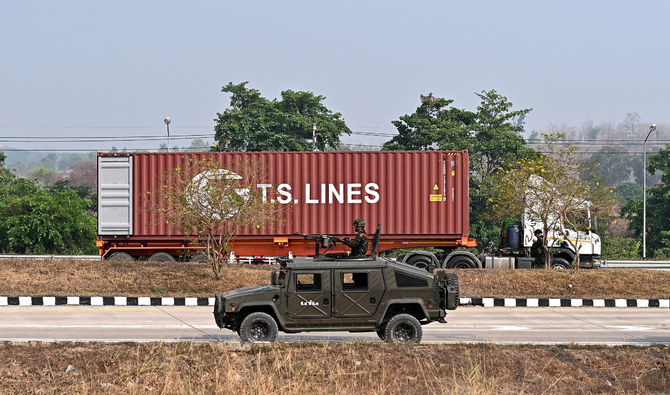
MYANMAR: A Myanmar rebel group has withdrawn its troops from a town along the Thai border following a counteroffensive by soldiers of the ruling junta from whom the resistance fighters had wrested the key trading post this month, an official said on Wednesday.
The Karen National Union made a “temporary retreat” from the town of Myawaddy, a spokesperson said, after the return of junta soldiers to the vital strategic area that is a conduit for annual foreign trade of more than $1 billion.
“KNLA troops will ... destroy the junta troops and their back-up troops who marched to Myawaddy,” said Saw Taw Nee, referring to the group’s armed wing, the Karen National Liberation Army, one of Myanmar’s oldest ethnic fighting forces.
He did not say what its next move would be, however.
Fighting had flared as recently as Saturday in Myawaddy, forcing 3,000 civilians to flee in a single day as rebels fought to flush out stranded Myanmar government troops holed up at a border bridge crossing.
On Wednesday, Thailand said the fighting had eased and it hoped to re-open its border crossing as trade had been hit. It said most civilians had returned and 650 remained.
“The situation has improved significantly,” spokesperson Nikorndej Balankura told a briefing. “Nevertheless, we are closely monitoring the situation, which is highly uncertain and can change.”
Thailand has received reports that negotiations may be starting between rival groups on the Myanmar side, Nikorndej said, without elaborating.
He added that Thailand had proposed to Laos, the chair of the Association of Southeast Asian Nations, that it could host a meeting seeking to end the Myanmar crisis.
Ukraine uses long-range missiles secretly provided by US to hit Russian-held areas, officials say
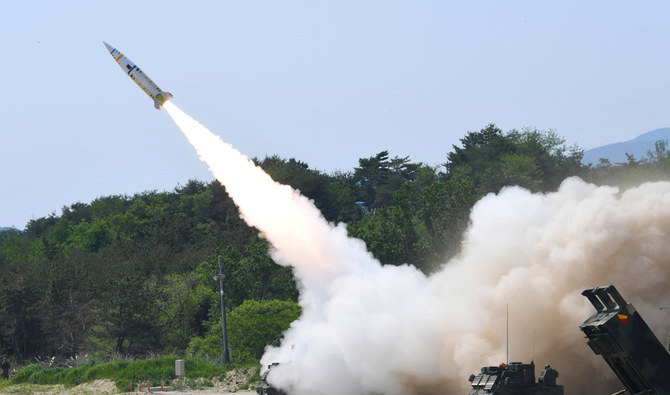
- The new missiles give Ukraine nearly double the striking distance up to 300 kilometers
- The two US officials would not provide the exact number of missiles given last month or in the latest aid package, which totals about $1 billion
WASHINGTON: Ukraine for the first time has begun using long-range ballistic missiles provided secretly by the United States, bombing a Russian military airfield in Crimea last week and Russian forces in another occupied area overnight, American officials said Wednesday.
Long sought by Ukrainian leaders, the new missiles give Ukraine nearly double the striking distance — up to 300 kilometers (190 miles) — that it had with the mid-range version of the weapon that it received from the US last October. One of the officials said the US is providing more of these missiles in a new military aid package signed by President Joe Biden on Wednesday.
Biden approved delivery of the long-range Army Tactical Missile System, known as ATACMS, in February, and then in March the US included a “significant” number of them in a $300 million aid package announced, one official said.
The two US officials, who spoke on condition of anonymity to discuss the delivery before it became public, would not provide the exact number of missiles given last month or in the latest aid package, which totals about $1 billion.
Ukraine has been forced to ration its weapons and is facing increasing Russian attacks. Ukraine had been begging for the long-range system because the missiles provide a critical ability to strike Russian targets that are farther away, allowing Ukrainian forces to stay safely out of range.
Information about the delivery was kept so quiet that lawmakers and others in recent days have been demanding that the US send the weapons — not knowing they were already in Ukraine.
For months, the US resisted sending Ukraine the long-range missiles out of concern that Kyiv could use them to hit deep into Russian territory, enraging Moscow and escalating the conflict. That was a key reason the administration sent the mid-range version, with a range of about 160 kilometers (roughly 100 miles), in October instead.
Adm. Christopher Grady, vice chairman of the Joint Chiefs of Staff, said Wednesday that the White House and military planners looked carefully at the risks of providing long-range fires to Ukraine and determined that the time was right to provide them now.
He told The Associated Press in an interview that long-range weapons will help Ukraine take out Russian logistics nodes and troop concentrations that are not on the front lines. Grady declined to identify what specific weapons were being provided but said they will be “very disruptive if used properly, and I’m confident they will be.”
Like many of the other sophisticated weapons systems provided to Ukraine, the administration weighed whether their use would risk further escalating the conflict. The administration is continuing to make clear that the weapons cannot be used to hit targets in Russia — only those inside Ukrainian territory, according to one of the US officials.
“I think the time is right, and the boss (Biden) made the decision the time is right to provide these based on where the fight is right now,” Grady said Wednesday. “I think it was a very well considered decision, and we really wrung it out — but again, any time you introduce a new system, any change — into a battlefield, you have to think through the escalatory nature of it.”
Ukrainian officials haven’t publicly acknowledged the receipt or use of long-range ATACMS. But in thanking Congress for passing the new aid bill Tuesday, Ukrainian President Volodymyr Zelensky noted on the social platform X that “Ukraine’s long-range capabilities, artillery and air defense are extremely important tools for the quick restoration of a just peace.”
One of the US officials said the Biden administration warned Russia last year that if Moscow acquired and used long-range ballistic missiles in Ukraine, Washington would provide the same capability to Kyiv.
Russia got some of those weapons from North Korea and has used them on the battlefield in Ukraine, said the official, prompting the Biden administration to greenlight the new long-range missiles.
The US had refused to confirm that the long-range missiles were given to Ukraine until they were actually used on the battlefield and Kyiv leaders approved the public release. One official said the weapons were used early last week to strike the airfield in Dzhankoi, a city in Crimea, a peninsula that Russia seized from Ukraine in 2014. They were used again overnight east of the occupied city of Berdyansk.
Videos on social media last week showed the explosions at the military airfield, but officials at the time would not confirm it was the ATACMS.
Ukraine’s first use of the weapon came as political gridlock in Congress had delayed approval of a $95 billion foreign aid package for months, including funding for Ukraine, Israel and other allies. Facing acute shortages of artillery and air defense systems, Ukraine has been rationing its munitions as US funding was delayed.
With the war now in its third year, Russia used the delay in US weapons deliveries and its own edge in firepower and personnel to step up attacks across eastern Ukraine. It has increasingly used satellite-guided gliding bombs — dropped from planes from a safe distance — to pummel Ukrainian forces beset by a shortage of troops and ammunition.
The mid-range missiles provided last year, and some of the long-range ones sent more recently, carry cluster munitions that open in the air when fired, releasing hundreds of bomblets rather than a single warhead. Others sent recently have a single warhead.
One critical factor in the March decision to send the weapons was the US Army’s ability to begin replacing the older ATACMS. The Army is now buying the Precision Strike Missile, so is more comfortable taking ATACMS off the shelves to provide to Ukraine, the official said.
Anger among Ukrainians in Poland as Kyiv halts passport renewals

- “Staying abroad does not relieve a citizen of his or her duties to the homeland,” Kuleba posted on social media
- The agency issuing passports to Ukrainian residents in Warsaw blamed a “technical error” for the problems, not the new directive from Kyiv
WARSAW: Hundreds of Ukrainians crammed up against a closed passport office in Warsaw on Wednesday, furious over Kyiv’s suspension of consular services for fighting-aged men in a bid to force them to return home and bolster troop numbers.
Ukrainian authorities said Tuesday that they were “temporarily” blocking men aged 18 to 60 from accessing consular services, after Foreign Minister Dmytro Kuleba said they were letting compatriots fight in their place on the front lines.
“Staying abroad does not relieve a citizen of his or her duties to the homeland,” Kuleba posted on social media.
The move is seen as part of Kyiv’s efforts to reinforce its army as soldiers struggle to hold positions against Russia.
But in Poland, which hosts hundreds of thousands of Ukrainians — both refugees from the conflict and those who were already living in the country when Russia invaded — there was anger among those who felt they were being unfairly targeted.
“This is a fight against people who are fleeing the army,” said Maksym, a 38-year-old truck driver, one of dozens of people who had come hoping to collect a new passport they had applied for — so far unsuccessfully.
“We are not asked on what grounds we went abroad... Why am I a draft dodger if I went abroad legally?” he told AFP.
Some said they had spent the whole night queueing up.
The agency issuing passports to Ukrainian residents in Warsaw blamed a “technical error” for the problems, not the new directive from Kyiv.
A heated argument broke out at the passport office when women accused a group of men of blocking the entrance and stopping other people who wanted to submit applications.
Pavlo Lyashenko, a 35-year-old entrepreneur standing nearby as the scene unfolded, told AFP that “The state has put me in a situation in which I have no way out.”
He said he had received a text message saying his passport was ready, but believed it was now being withheld from him.
“The doors are blocked. They are afraid that if I come inside, I will not leave until I receive my passport. I know it’s there,” Lyashenko said.
As the crowds swelled through the morning, the agency called in the Polish police as a precaution. Officers spoke with those queueing up, but did not otherwise intervene.
Diana Petrenko, deputy director of the Warsaw passport office, insisted that technical issues were to blame.
“Unfortunately, the documents are not issued due to technical reasons,” she told AFP, refusing to elaborate on the nature of the alleged glitch.
Ukraine’s foreign ministry said Tuesday that the suspension applied only to new applications and that any requests submitted before then would be honored.
Lyashenko, the entrepreneur, who said he had left Ukraine long before the start of the war, said he worried he could end up in a legal grey zone, abroad but without a valid passport.
“I think that our state is simply driving people to the point that we will all need to do this,” he said.
Although there are some exceptions, most Ukrainian men have been barred from leaving the country since Russia invaded in February 2022 — meaning that many who will now be unable to submit new passport applications had already been living away for years.
According to Ukrainian media, hundreds of thousands of working-age men have sought refuge in EU countries since the start of the war.
The consular service suspensions, which come as Kyiv scrambles to recruit troops, is widely seen as an attempt to force fighting-age men back to Ukraine.
President Volodymyr Zelensky’s government also recently passed a new mobilization law designed to help lift army numbers, and lowered the age limit for mobilization to 25 from 27.
The mobilization law, due to come into force mid-May, also toughens penalties against draft dodgers and forces men to keep their military registration up to date.
The foreign ministry said the suspension of consular services was a temporary measure needed to “resolve technical issues” linked with the implementation of the new law.
Bogdan, a Ukrainian truck driver who declined to give his full name, said he was stuck waiting for a second day straight at the Warsaw passport office.
“I drove 700 kilometers (435 miles) to get my passport because I received a text message that I could pick it up,” the 27-year-old said.
“No one gives the passport. What are our next steps?” he said. “What do we have to do to simply be given our documents that we paid for?“


